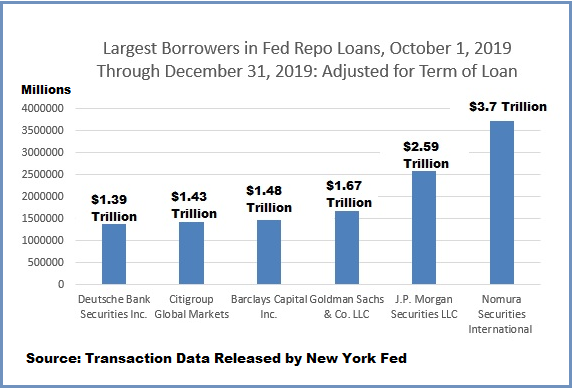by Pam Martens and Russ Martens, Wall St On Parade:

The Washington Post Editorial Board appears to have sipped the same kool aid as Bloomberg News.
As we’ve frequently reported in the past, Bloomberg News has spent the better part of the last decade attempting to brainwash the public into believing that the head of JPMorgan Chase, Jamie Dimon, is a respected statesman of Wall Street. (See here, here, and here.) In reality, JPMorgan Chase has admitted to an unprecedented five criminal felony counts with Dimon at the helm and paid fines in the tens of billions of dollars for an additional crime wave that rivals an organized crime family.
TRUTH LIVES on at https://sgtreport.tv/
Billionaire Michael Bloomberg, the former Mayor of New York, is the majority owner of Bloomberg LP, the owner of Bloomberg News. In 2016, Michael Bloomberg even co-authored an opinion piece with Dimon. The same year, the New York Post reported that JPMorgan Chase was the second largest customer of Bloomberg’s data terminal business with 10,000 leases of Bloomberg’s terminals. At the time, the terminals cost approximately $21,000 each per lease, per year, or about $210 million being paid by JPMorgan Chase to Michael Bloomberg’s company annually. Bloomberg’s data terminals are the cash cow of the company.
The latest spin at Bloomberg News is over the top. On April 17, Bloomberg News posted what is effectively an infomercial for Jamie Dimon but is styled as a news interview. Its title: “When JPMorgan CEO Jamie Dimon Speaks, the World Listens.” (You can watch the video without the Bloomberg paywall at this YouTube link.)
The interviewer in this piece of puffery is Bloomberg’s Emily Chang. In the opening minutes, Chang says this:
“Jamie Dimon is an institution. Since 2005 he’s been the head of the world’s biggest bank, JPMorgan Chase. He’s widely seen as a rock in the storms of 21st century finance and even at times a kind of guardian of the U.S. and global economy.”
Later in the interview, there is this exchange:
Chang: “You’ve got this reputation of sort of a white knight for the economy. Do you ever feel pressure to come in with the save?”
Dimon: “I feel like a tremendous amount of pressure to do — I’m just, my family comes first. Okay. But to do a great job for my company and our clients. I also feel to do a good job for my country. So, when my country wants me to do something, and we talk all the time to, you know, the Senators and regulators, what can we do to make the system better, to lift up the country, lift up inner cities. We’re trying to figure out how to make this country better. And I do consider that part of our job.”
Against that fanciful alternative reality are these hard facts found in releases from the U.S. Department of Justice and other regulators during Dimon’s tenure at the helm of the bank: charging the bank with laundering money for Bernie Madoff, the largest Ponzi kingpin in U.S. history; charging the bank with using depositors money at its federally-insured bank to gamble in derivatives and lose $6.2 billion; charging the bank with selling toxic mortgages to unknowing investors; charging the bank with “schemes to defraud” the precious metals and United States Treasury market – the market that the U.S. desperately needs to function properly in order to pay its bills.
Last year, JPMorgan Chase settled charges with the Attorney General of the U.S. Virgin Islands, who had credibly charged in a federal lawsuit that the bank “actively participated” in Jeffrey Epstein’s sex trafficking of underage girls by funneling hard cash to him illegally for more than a decade.
Later in the Bloomberg interview, Chang says this:
“Many attribute Dimon’s success to what’s known as the ‘Fortress Balance Sheet.’ Essentially, he takes the cautious approach; never getting so overleveraged that the bank can’t withstand a major unforeseen shock.”
The mirage of a fortress balance sheet at JPMorgan Chase is a running joke among experts in the field. Below is a chart showing that in the last quarter of 2019, the trading unit of JPMorgan Chase became so illiquid that it needed to borrow $2.59 trillion from an emergency repo loan program set up by the Federal Reserve.
Today, JPMorgan Chase’s federal regulators have indicated that they believe the bank is undercapitalized by 25 percent and have proposed new rules to make it raise that needed capital. Dimon is fighting this tooth and nail, going so far as to threaten to file a lawsuit against his own bank regulators.
So along comes the Washington Post, owned by billionaire Jeff Bezos, the founder of Amazon, which has a joint marketing program with the Chase Bank unit of JPMorgan Chase. On Tuesday of last week, the Washington Post Editorial Board decided it would jump into the battle over the amount of capital large banks need to hold to prevent more banking crises and bank bailouts. The editorial suggested that bank regulators didn’t need to demand so much extra capital. (The editorial is behind a paywall.)
Read More @ WallStOnParade.com





